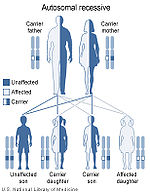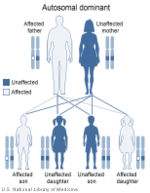- Kostmann syndrome
-
Kostmann syndrome Classification and external resources ICD-10 D70 ICD-9 288.01 OMIM 610738 DiseasesDB 29519 eMedicine ped/1260 Kostmann syndrome, also known as severe congenital neutropenia, autosomal recessive type 3 (SCN3) and Kostmann disease,[1] is a rare autosomal recessive form of severe chronic neutropenia usually detected soon after birth.[2][3] The disorder was discovered in 1956 by Swedish doctor Kostmann.[4][5]
Contents
Genetics
Kostmann syndrome is inherited in an autosomal recessive manner, but may occasionally be autosomal dominant.[2] Autosomal recessive inheritance means the defective gene responsible for the disorder is located on an autosome, but two copies of the defective gene (one inherited from each parent) are required in order to be born with the disorder. The parents of an individual with an autosomal recessive disorder both carry one copy of the defective gene, but usually do not experience any signs or symptoms of the disorder.
Autosomal dominant inheritance indicates that the defective gene responsible for a disorder is located on an autosome, and only one copy of the gene is sufficient to cause the disorder, when inherited from a parent who has the disorder.
Diagnosis
An absolute neutrophil count (ANC) chronically less than 500/mm3 is the main sign of Kostmann's. A standard bone marrow test can give correct diagnosis.
Morphology
Bone marrow usually shows the presence of early granulocytes (promyelocyte/myelocyte arrest) but few maturing forms are seen; neutrophil survival is normal.
Pathophysiology
Homozygous mutations in the HAX1 gene are associated with Kostmann disease, i.e. the "classical," autosomal recessive form of severe congenital neutropenia (SCN3).
In patients with the autosomal dominant form of severe congenital neutropenia (SCN1), although the underlying genetic defect in myeloid precursor cells is not entirely elucidated, mutations in the gene (ELA2) encoding neutrophil elastase appear to be present in most patients. These mutations may be responsible for the untimely initiation of apoptosis in myelocytes, producing their premature destruction, and interrupting the normal cycle of maturation. There may be, in addition, other underlying molecular/genetic changes producing DNA mutations and genome instability, which contribute to initiation and progression of this disease. Regular administration of exogenous granulocyte colony-stimulating factor (Filgrastim) clinically improves neutrophil counts and immune function and is the current mainstay of therapy, although this may increase risk for myelofibrosis and acute myeloid leukemia in the long term.[6]
See also
References
- ^ Online 'Mendelian Inheritance in Man' (OMIM) 610738
- ^ a b Zeidler C, Welte K (2002). "Kostmann syndrome and severe congenital neutropenia". Semin. Hematol. 39 (2): 82–8. doi:10.1053/shem.2002.31913. PMID 11957189. http://linkinghub.elsevier.com/retrieve/pii/S0037196302500172.
- ^ Christensen RD, Calhoun DA (2004). "Congenital neutropenia". Clin Perinatol 31 (1): 29–38. doi:10.1016/j.clp.2004.03.011. PMID 15183654. http://linkinghub.elsevier.com/retrieve/pii/S0095510804000120.
- ^ Kostmann R (1956). "Infantile genetic agranulocytosis; agranulocytosis infantilis hereditaria.". Acta Paediatr 45 (Suppl 105): 1–78. PMID 13326376.
- ^ Klein, C.; Grudzien, M.; Appaswamy, G.; Germeshausen, M.; Sandrock, I.; Schäffer, A. A.; Rathinam, C.; Boztug, K. et al. (Jan 2006). "HAX1 deficiency causes autosomal recessive severe congenital neutropenia (Kostmann disease)". Nature Genetics 39 (1): 86–92. doi:10.1038/ng1940. PMID 17187068.
- ^ Hoffbrand AV, Moss PAH, Pettit JE (2005). Essenial Haematology. Blackwell Publishing. ISBN 978-1-4051-3649-5.
- ^ Klein, Christoph (2011). "Genetic Defects in Severe Congenital Neutropenia: Emerging Insights into Life and Death of Human Neutrophil Granulocytes". Annual Review of Immunology 29: 399–413. doi:10.1146/annurev-immunol-030409-101259. PMID 21219176. http://www.annualreviews.org/doi/full/10.1146/annurev-immunol-030409-101259.
External links
- The European network Neutro-Net
- GeneReviews/NCBI/NIH/UW entry on ELANE-Related Neutropenia including Cyclic Neutropenia, Severe Congenital Neutropenia
- Severe Congenital Neutropenia research study of Inherited Bone Marrow Failure Syndromes (IBMFS)
- Medicine Net
- Severe congenital neutropenia at NIH's Office of Rare Diseases
- Severe Chronic Neutropenia International Registry
Hematologic disease: Monocyte and granulocyte disease (CFU-GM/CFU-Baso/CFU-Eos), including immunodeficiency (D70-D71, 288) Monocytes/
macrophages↑↓Granulocytes ↑↓PBD Categories:- Syndromes
- Congenital defects of phagocyte number, function, or both
- Autosomal recessive disorders
- Autosomal dominant disorders
- Enzyme defects
- Genetic disorder stubs
Wikimedia Foundation. 2010.


